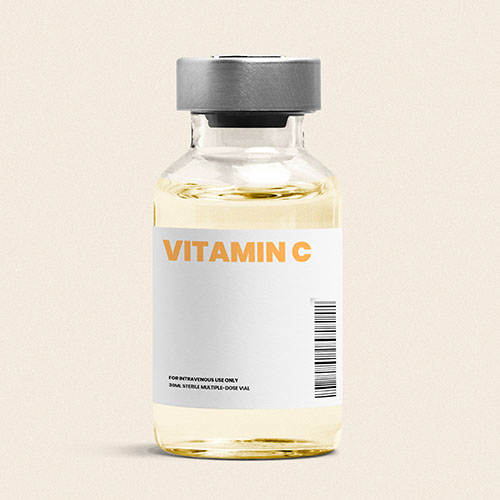vitamin C
What is Vitamin C?
Vitamin C injections are used for various medical and wellness purposes. While oral vitamin C is beneficial, injections or intravenous (IV) administration can provide certain advantages, especially in cases where high doses are needed or absorption issues exist.
What are the advantages to Vitamin C?
- Enhanced Absorption and Bioavailability
- Higher Absorption Rates: When taken orally, vitamin C absorption is limited by the digestive system. Injections bypass the gastrointestinal tract, leading to significantly higher bioavailability and absorption.
- Faster Onset of Action: Injecting vitamin C allows it to enter the bloodstream immediately, providing quicker results compared to oral supplements.
- Boosts Immune Function
- Increased Immune Support: Vitamin C is a potent antioxidant that strengthens the immune system, enhances white blood cell function, and helps the body fight infections.
- Higher Doses for Illness: In cases of acute illness or infections (e.g., colds, flu), IV vitamin C can provide higher doses than oral intake, which may support faster recovery.
- Potent Antioxidant Effects
- Neutralizing Free Radicals: Vitamin C injections help neutralize harmful free radicals, reducing oxidative stress, which is linked to aging, chronic inflammation, and disease development.
- Skin Health and Anti-Aging: Its antioxidant properties help boost collagen production, contributing to improved skin elasticity, wound healing, and potentially reducing the appearance of wrinkles.
- Energy and Fatigue Reduction
- Fights Fatigue: Vitamin C injections are sometimes used to combat fatigue and improve energy levels. They can support adrenal function, which plays a role in managing stress and energy production.
- Enhances Iron Absorption: Vitamin C increases iron absorption, helping to prevent anemia and associated symptoms of low energy.
- Cancer Therapy Support
- Adjunctive Cancer Treatment: High-dose vitamin C, typically administered via injection or IV, has been used experimentally as a complementary treatment in cancer therapy. It may enhance the effectiveness of chemotherapy, reduce side effects, and improve overall quality of life.
- Selective Toxicity: Some studies suggest that at very high doses, vitamin C can have a toxic effect on cancer cells while leaving healthy cells unharmed. However, this is still under investigation.
- Wound Healing and Tissue Repair
- Collagen Production: Vitamin C is essential for collagen synthesis, which is crucial for wound healing, tissue repair, and maintaining skin health. Injections may accelerate recovery from injuries or surgeries.
- Enhanced Healing: People with poor healing conditions, such as ulcers or post-surgery recovery, may benefit from injections to speed up the healing process.
- Chronic Disease Prevention
- Cardiovascular Health: Vitamin C helps improve vascular health by reducing inflammation and lowering blood pressure. It may reduce the risk of heart disease by preventing oxidative damage to the arteries.
- Chronic Conditions: Injections can help manage conditions linked to chronic inflammation and oxidative stress, such as arthritis, asthma, and other inflammatory disorders.
- Improves Skin Health
- Glowing Skin: Due to its role in collagen production and skin repair, vitamin C injections can lead to brighter and more youthful-looking skin.
- Hyperpigmentation: It can help reduce hyperpigmentation and even out skin tone by inhibiting melanin production.
- Support for Patients with Deficiencies or Malabsorption
- Vitamin C Deficiency (Scurvy): People with severe vitamin C deficiency (scurvy) can benefit from injections for rapid replenishment.
- Malabsorption Issues: Those with gastrointestinal issues or malabsorption disorders (e.g., Crohn’s disease, celiac disease) who cannot adequately absorb vitamin C from food or oral supplements may require injections to ensure proper intake.
- Potential Mood and Cognitive Benefits
- Mood Enhancement: Vitamin C has been linked to improvements in mood and cognitive function, likely due to its role in reducing oxidative stress and inflammation in the brain.
- Cognitive Function: There is ongoing research into vitamin C’s neuroprotective effects and its potential role in preventing or mitigating cognitive decline, particularly in aging populations.
- Supports Detoxification
- Liver Detoxification: Vitamin C injections can help support the body’s natural detoxification processes, particularly in the liver, by reducing toxins and promoting antioxidant protection.

Risks and Considerations
While vitamin C injections have many benefits, it’s important to consider potential risks:
- Allergic Reactions: Rarely, some people may experience an allergic reaction to the injection.
- Kidney Stones: High doses of vitamin C may increase the risk of kidney stones, especially in individuals prone to them.
- Blood Sugar Levels: It may interfere with blood sugar testing, leading to false results.
Vitamin C injections should be administered under the guidance of a healthcare provider, especially at higher doses or for therapeutic use.



